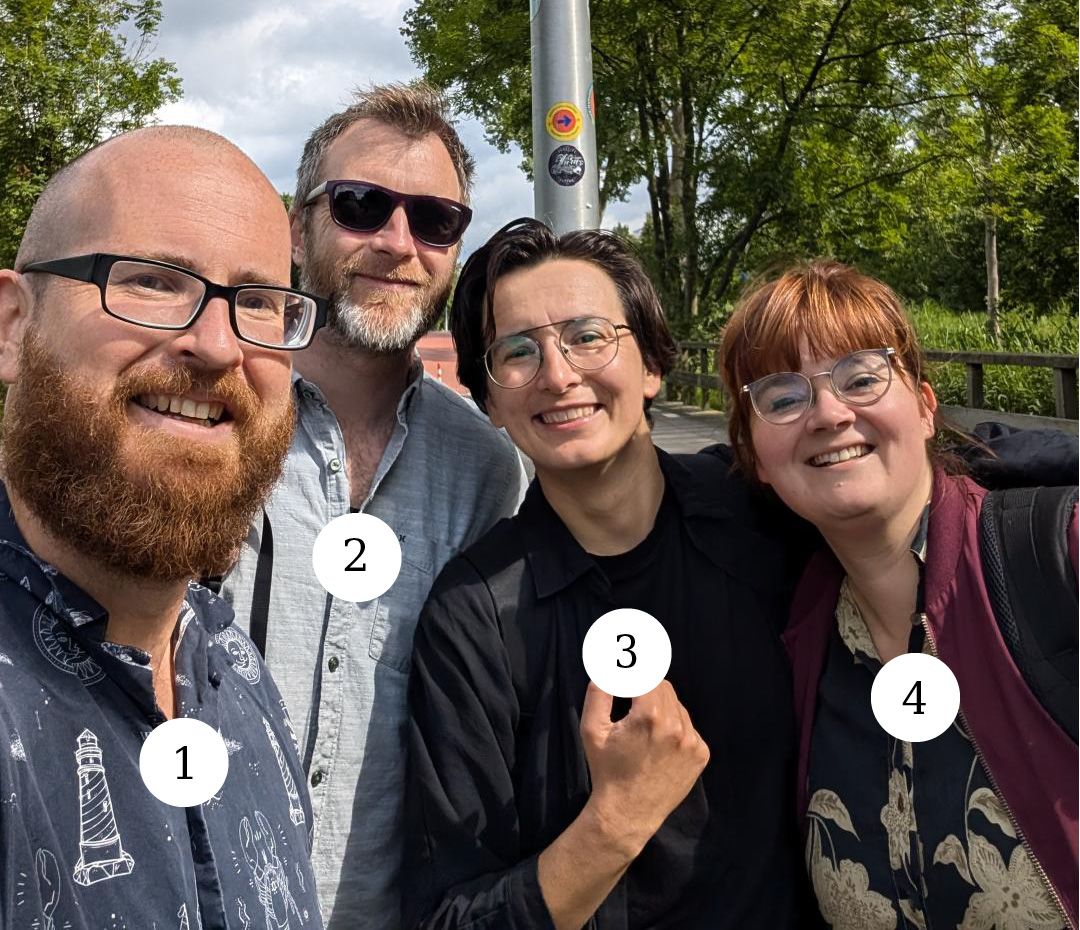We/The Sounder
Who we are
A sounder is a herd of pigs. We/The sounder are three postdoctoral researchers and one doctoral researcher employed as part of the ERC BOAR project until 2025.

1. Paul Keil; 2. Kieran O'Mahony; 3. Marianna Szczygielska; 4. Laura Kuen. Our profiles can be found below.
Calling ourselves "the sounder" pokes fun at and creates some distance from the gendered, historical, and incorrect associations our research project title "BOAR" generates about pigs.
Boars are male pigs, and not all languages refer to wild pigs through the male figure. The circumstance that the English language names all wild pigs as boar is historically connected to kingship, heraldry, and hunters that favoured the male for their ferocity.1 These desired and arguably masculinised qualities were typical responses of the boar to the provocative nature of the hunt. In addition, the male pig is also a solitary figure who tends to roam alone, whereas most pigs (females and juvenile males) move as part of a matriarchal sounder. Through the word boar the lone, ferocious, male pig came to (mis)represent all wild pigs.
As researchers, playfully calling ourselves a sounder not only reflects a broadened comprehension of pigs, but also helps remind us that science is not necessarily made by highly driven, solitary visionaries. The boar is a hero myth. Instead, good research and theory often come to fruition through a group, through the work and play, humour and tension of the sounder. Despite the singular associations the name BOAR brings, however, the value of conducting research together has always been recognised by the broader BOAR project team and its primary investigator, Ludek Broz. This is a good opportunity to acknowledge that other BOAR team members have contributed comments and content to this website - especially fellow postdoctoral researcher and honorary sounder member André Thiemann.
You can find the profiles of the individuals who comprise the Sounder below.
Paul G. Keil
Paul G. Keil is a human–animal ethnographer who engages in the fields of social anthropology and environmental humanities. Keil’s regional expertise is based in Assam, India and Australia, where he conducts ethnographic research on human–wildlife relations, working animals, hunting, and biosecurity practices. His analytical interests emerge from questions regarding interspecies coexistence and teamwork, aesthetics and ethics, as well as uncertainty and vulnerability in more-than-human worlds.
Kieran O'Mahony
Kieran is a more-than-human geographer whose work primarily explores the contested politics of landscape, conservation practice, and biosecurity. In particular, he is interested in the sociotechnological knowledges, moral ecologies and multispecies relations that emerge amidst environmental change. His interdisciplinary background has fostered an enduring interest in multi-modal methods, and keenness to explore the novel ways through which researchers can try to make sense of the lifeworlds of elusive nonhuman beings.
Marianna Szczygielska
Marianna Szczygielska is a feminist historian of science who brings queer and decolonial approaches into reflection on human-animal relations. Her work historicizes the roles of zoos, wildlife conservation practices, and veterinary expertise in Central Eastern Europe. Through archival and theoretical research, Szczygielska uncovers animal histories to explore the intersections of captivity, mobility, and materiality in environmental knowledge production. She is continuously inspired by artistic and scientific modes of weaving interspecies relations.
Laura J. Kuen
Laura J. Kuen is an anthropologist whose work explores multispecies relations of food, care, and mutual sustenance through the lens of environmental anthropology and the environmental humanities. Her regional focus lies in Western Ukraine, where she conducts ethnographic research in small-scale farming communities shaped by migration, conflict, and ecological change. Bringing together more-than-human anthropology with visual and multimodal methods – including documentary filmmaking and exhibition curation – she aims to communicate shifting multispecies attachments in ways that resonate both within and beyond academia.
Footnotes
-
Note the French call wild pigs "sanglier" and Italians "cinghiale" which etymologically comes from the Latin singularis (porcis) or the solitary pig. ↩